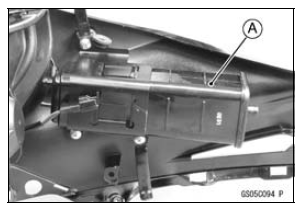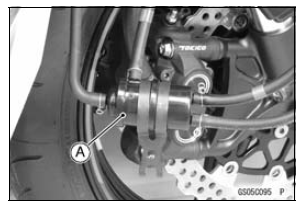

Remove the upper fairing assembly (see Upper Fairing Assembly Removal in the Frame chapter).
Remove the canister [A].
Visually inspect the canister for cracks or other damage.
If the canister has any cracks or bad damage, replace it with a new one.

NOTE
The canister is designed to work well through themotorcycle’s life without any maintenance if it is used under normal conditions.
Remove the upper fairing assembly (see Upper Fairing Assembly Removal in the Frame chapter).
Disconnect the hoses from the separator [A].
Visually inspect the separator for cracks and other damage.
If the separator has any cracks or damage, replace it with a new one.
To prevent the gasoline from flowing into or out of the canister, hold the separator perpendicular to the ground.

Check that the hoses are securely connected and clips are in position.
Replace any kinked, deteriorated or damaged hoses.
Run the hoses according to Cable, Wire, and Hose Routing section in the Appendix chapter.
When installing the hoses, avoid sharp bending, kinking, flattening or twisting, and run the hoses with a minimum of bending so that the emission flow will not be obstructed.
 Fuel Hose Inspection (fuel leak, damage, installation condition)
Fuel Hose Inspection (fuel leak, damage, installation condition) Cooling System
Cooling SystemLeather, Vinyl, and Rubber
If your motorcycle has leather accessories,
special care must be taken.
Use a leather cleaner/treatment to
clean and care for leather accessories.
Washing leather parts with detergent
and water will damage them, shortening
their life.
Vinyl parts should be washed with the
rest of themo ...
Clutch
Clutch Operation Inspection
Pull the clutch lever just enough to take up the free play
[A].
Measure the gap between the lever and the lever holder.
If the gap is too wide, the clutch may not release fully. If
the gap is too narrow, the clutch may not engage fully. In
either case, adjust ...
Brake Fluid Change
NOTE
The procedure to change the front brake fluid is as follows.
Changing the rear brake fluid is the same as for
the front brake.
Level the brake fluid reservoir.
Remove:
Screw [A]
Stopper [B]
Front Brake Reservoir Cap [C]
Diaphragm Plate
Diaphragm
Remove the rubb ...